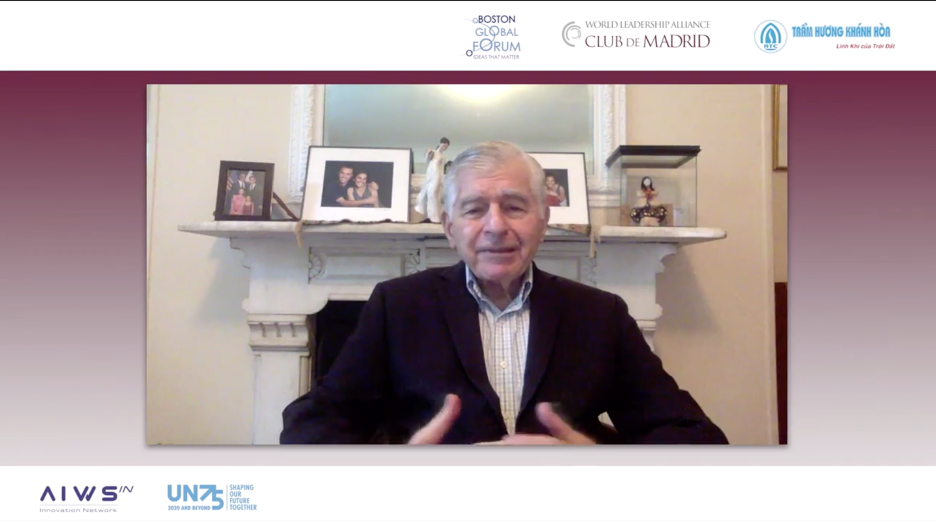
by Editor | Sep 27, 2020 | News
Dear Friends,
Last week the Boston Global Forum (BGF) and the World Leadership Alliance-Club de Madrid (WLA-CdM) organized a policy lab on Translatlantic Approaches to Digital Governance: Social Contract for the AI Age. The event featured several panels on the growing importance of AI and digital policy. It is clear that the process of “digitalization” is accelerating. Countries are now confronting new challenges, as well as new opportunities.
Advances in AI raise policy issues that must be assessed. We must now focus through dialogue, tolerance, learning and understanding on key principles and practices for an agreement among members of society for shared social benefit. And we believe it is vitally important that democratic leaders make clear our support for fundamental rights and the rule of law in this Age of AI. We want to ensure that AI supports sustainable development, inclusion, fairness and accountability.
Our next step is to build public support for the Social Contract for the Age of AI. This global declaration sets out a human-centric approach for the governance of AI. The Social Contract is the outcome of a collaboration over the last several years between the BGF and the CdM/WLA.
We are asking you to join us, as signatories, in support of this initiative. Over the next several months, we will reach out to innovators, thinkers, advocates, and other world leaders. Our aim is to build support for the Social Contract and to educate the public about the many issues we will confront in the years ahead. We are also developing monitoring mechanisms so that we can begin to assess national progress toward the goals that we have set out.
You will find more information about the Social Contract for the Age of AI here. If you would like to endorse, please contact Tuan Nguyen, director of the Michael Dukakis Institute.
Thank you for your continued interest in this work.
Sincerely,
Governor Michael Dukakis, Boston Global Forum, and
President Vaira Vīķe-Freiberga, Latvia and World Leadership Alliance-Club de Madrid



by Editor | Sep 27, 2020 | News
Major NIH award to study how the brain infers structure from sensory signals may have applications for disorders like schizophrenia and offer insights for artificial intelligence.
Imagine you’re sitting on a train. You look out the window and see another train on an adjacent track that appears to be moving. But, has your train stopped while the other train is moving, or are you moving while the other train is stopped?
The same sensory experience—viewing a train—can yield two very different perceptions, leading you to feel either a sensation of yourself in motion or a sensation of being stationary while an object moves around you.
Human brains are constantly faced with such ambiguous sensory inputs. In order to resolve the ambiguity and correctly perceive the world, our brains employ a process known as causal inference.
Causal inference is a key to learning, reasoning, and decision making, but researchers currently know little about the neurons involved in the process.
Recognizing how the brain uses causal inference to separate self-motion from object motion may help in designing artificial intelligence and autopilot devices.
“Understanding how the brain infers self-motion and object motion might provide inspiration for improving existing algorithms for autopilot devices on planes and self-driving cars,” Haefner says.
For example, a plane’s circuitry must take into account the plane’s self-motion in the air while also avoiding other moving planes appearing around it.
The research may additionally have important applications in developing treatments and therapies for neural disorders such as autism and schizophrenia, conditions in which casual inference is thought to be impaired.
The original article can be found here.
In the field of AI and Causal Inference, Professor Judea Pearl is a pioneer for developing a theory of causal and counterfactual inference based on structural models. In 2011, Professor Pearl won the Turing Award, computer science’s highest honor, for “fundamental contributions to artificial intelligence through the development of a calculus of probabilistic and causal reasoning.” In 2020, Professor Pearl is also awarded as World Leader in AI World Society (AIWS.net) by Michael Dukakis Institute for Leadership and Innovation (MDI) and Boston Global Forum (BGF). At this moment, Professor Judea also contributes to Causal Inference for AI transparency, which is one of important AIWS.net topics on AI Ethics.
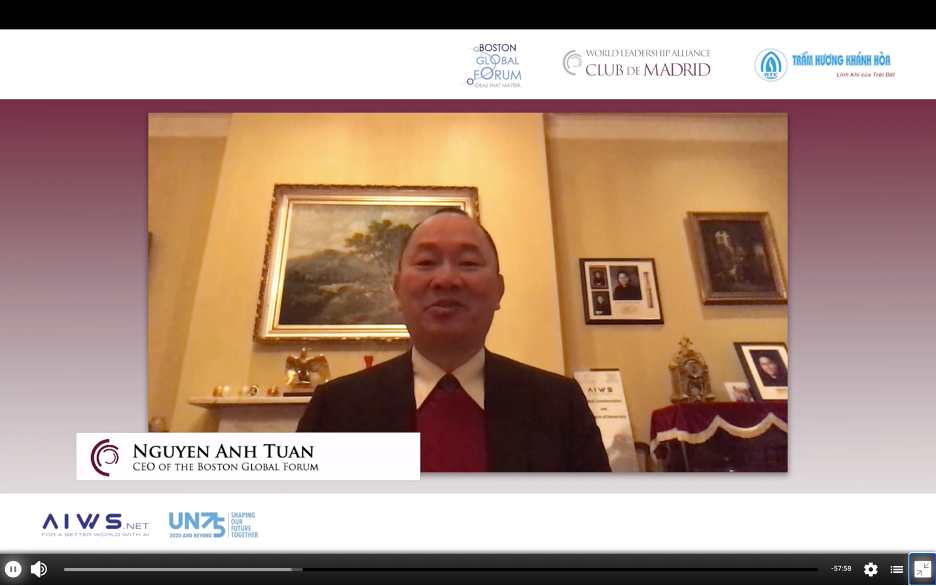
by Editor | Sep 19, 2020 | News
On September 17, at Session I of this event, Mr. Nguyen Anh Tuan, CEO of the Boston Global Forum, Co-Author of Social Contract for the AI Age, introduced the model of AI World Society City (AIWS City). AIWS City as a method of practicing the Social Contract for the AI Age.
The AIWS City is an all-digital virtual city based on trusted open data, that applies the standards of “Social Contract for the AI Age”, “People Centered Economy”, “Trustworthy Economy”, “Intellectual Society, a thoughtful civil society”, and “AI-Government”.
- The AIWS City can assist citizens to become more thoughtful by enhancing knowledge, critical thinking and social responsibility
- AIWS creates the concept of AIWS Value. AIWS Value: traditional value (products, services, data, innovation, creativities, etc.) + social values (contributions). Recognize and exchange traditional and social values.
- The AIWS City will operate based on AIWS Value in order to create a good Ecosystem of the People Centered Economy – “all people can create value for each other”.
- Slogan: “People Centered AI andInternet Ecosystem for Work and Life”.
- The AIWS City Board of Leaders are: Governor Michael Dukakis, Chairman of the Boston Global Forum, Nguyen Anh Tuan, CEO of The Boston Global Forum, Professor Alex Pentland, MIT, Vint Cerf, Father of the Internet, Chief Internet Evangelist of Google, Professor Zlatko Lagumdzija, Former Prime Minister of Bosnia and Herzegovina, Professor Nazli Choucri, MIT, Professor David Silbersweig, Harvard University, Professor Thomas Patterson, Harvard University, Marc Rotenberg, Director of Center for AI and Digital Policy at Michael Dukakis Institute.

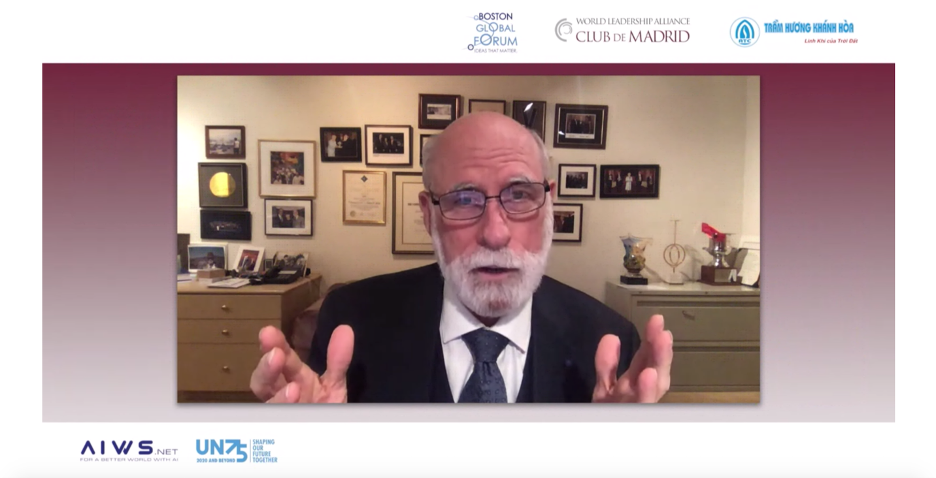
by Editor | Sep 19, 2020 | News
On September 17 at Session I: The AIWS Social Contract 2020 and AIWS Innovation Network: A Platform for Transatlantic Cooperation, the Lead Speaker and Facilitator was Nazli Choucri, Boston Global Forum Board Member and Professor of Political Science at the Massachusetts Institute of Technology (MIT)
Panel discussion:
- Esko Aho, WLA-CdM Member, Prime Minister of Finland (1991-1995)
- Vaira Vike-Freiberga, WLA-CdM Member, President of Latvia (1999-2007)
- Vint Cerf, Father of the Internet, Chief Internet Evangelist, Google
- Nguyen Anh Tuan, CEO of the Boston Global Forum, “Presentation AIWS City, a practicing of The Social Contract 2020, A New Social Contract in the Age of AI”
The panel discussed the Social Contract for the AI Age and AIWS City. In this session participants are President Vaira Vike-Freiberga, Vint Cerf, both World Leader in AIWS Award recipients, Professor Nazli Choucri, MIT, Board Member of the Boston Global Forum, Michael Dukakis Institute, History of AI at AIWS.net, Mr. Nguyen Anh Tuan, CEO of the Boston Global Forum. Professor Choucri is lead speaker and moderator of this session. She talked about the Social Contract for the AI Age, and Mr. Tuan introduced new concepts found in the Social Contract for the AI Age such as Intellectual Society and Smart Democracy, as well as the model of AIWS City.
Link: https://boston.dialoguescdm.org/on-demand/#02




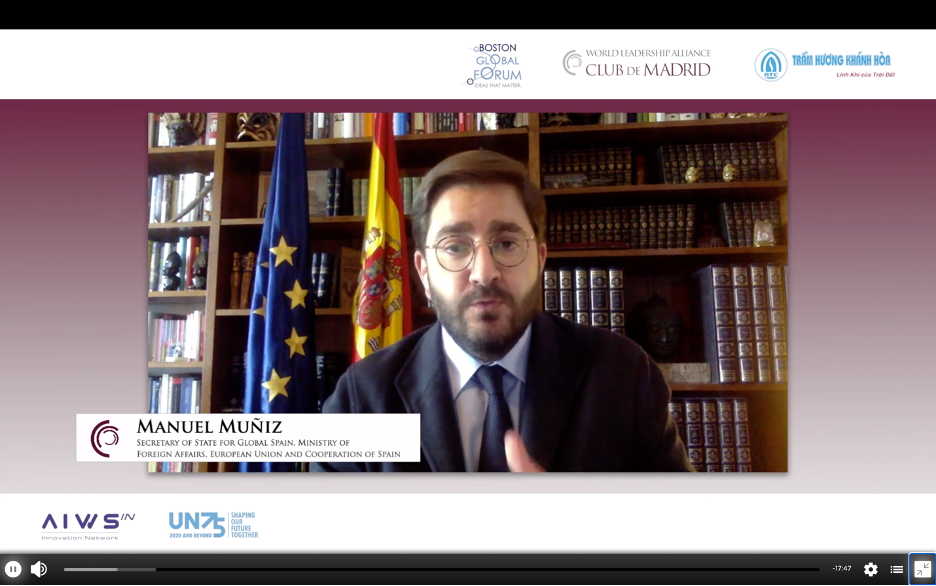
by Editor | Sep 19, 2020 | Event Updates
On September 16, 2020, at the Welcome and Introductory Session of World Leadership Alliance-Club de Madrid Policy Lab: Transatlantic Approaches on Digital Governance – A New Social Contract on Artificial Intelligence, after keynote speech of Manuel Muñiz, Secretary of State for Global Spain, Ministry of Foreign Affairs, European Union and Cooperation of Spain, Professor Thomas Patterson, Board Member of the Boston Global Forum, launched and presented Social Contract for the AI Age. Mr. Ramu Damodaran, Chief of the Academic Impact, United Nations, and Editor in Chief of the United Nations Chronicle Magazine, moderated the discussion. Discussants include Prime Minister of Latvia, Valdis Birkavs.
The list of speakers of the special sessions are below.
Welcome Session
- Danilo Türk, President of WLA-CdM, President of Slovenia (2007-2012)
- Manuel Muñiz, Secretary of State for Global Spain, Ministry of Foreign Affairs, European Union and Cooperation of Spain
- Mr. Nguyen Van Tuong, Chairman of Tram Huong Khanh Hoa
- Governor Michael Dukakis, Chair of The Boston Global Forum
- Keynote Speech “Transatlantic Relations and the Digital Social Contract”
- Manuel Muñiz, Secretary of State for Global Spain, Ministry of Foreign Affairs, European Union and Cooperation of Spain
Introductory Session: A New Social Contract in the Age of AI
Keynote: Thomas Patterson, Research Director of The Michael Dukakis Institute for Leadership and Innovation, Professor of Government and the Press of Harvard Kennedy School
Facilitator: Ramu Damodaran, Editor-in-Chief of the UN Chronicle and Chief of the United Nations Academic Impact
Panel discussion:
- Valdis Birkavs, WLA-CdM Member, Prime Minister of Latvia (1993-1994)
- Jerry Jones, WLA-CdM Advisor Executive Vice-President, Ethics and Legal Officer, Live Ramp and Advisor
- Nuria Oliver, IEEE Fellow, ACM Fellow, member of the High Level Expert Group on B2G data sharing at the European Commission
Link: https://boston.dialoguescdm.org/on-demand/#02





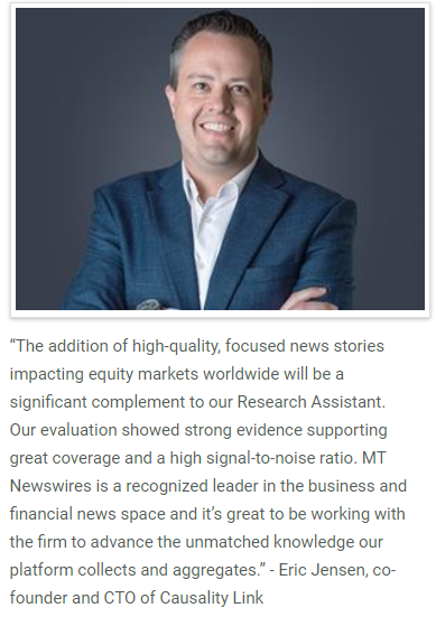
by Editor | Sep 19, 2020 | News
Causality Link, an advanced, AI-driven investment technology provider, today announced an agreement with MT Newswires to incorporate the financial news information provider’s industry-leading content into the Causality Link Research Assistant platform.
MT Newswires’ global financial news strengthens Causality Link’s vast and growing corpus of content with a perspective relied upon by institutional investors globally. By leveraging MT Newswires’ “Live Briefs PRO – Global Markets” offering — a comprehensive, real-time, multi-asset feed of global capital markets and economic events –Causality Link gains more than 130 categories of original, ticker-tagged and meta-coded content that will augment the Research Assistant’s signals and financial models.
“The addition of high-quality, focused news stories impacting equity markets worldwide will be a significant complement to our Research Assistant,” said Eric Jensen, co-founder and CTO of Causality Link. “Our evaluation showed strong evidence supporting great coverage and a high signal-to-noise ratio. MT Newswires is a recognized leader in the business and financial news space and it’s great to be working with the firm to advance the unmatched knowledge our platform collects and aggregates.”
Causality Link’s unique, AI-powered Research Assistant extracts the knowledge contained within millions of documents and other text-based sources to provide investors and analysts with a unique perspective on companies, industries and macroeconomic drivers. By aggregating explicitly stated cause-and-effect relationships between market indicators and company key performance indicators (KPIs), the Causality Link platform provides clients with more significant, longer-lasting, less emotional and more precise insights and forecasts. With the help of its proprietary machine learning (ML) and natural language processing (NLP) technologies, the solution is leading the next wave of AI innovation to aggregate human knowledge from thousands of authors.
In the field of AI and Causality, Professor Judea Pearl is a pioneer for developing a theory of causal and counterfactual inference based on structural models. In 2011, Professor Pearl won the Turing Award, computer science’s highest honor, for “fundamental contributions to artificial intelligence through the development of a calculus of probabilistic and causal reasoning.” In 2020, Professor Pearl is also awarded as World Leader in AI World Society (AIWS.net) by Michael Dukakis Institute for Leadership and Innovation (MDI) and Boston Global Forum (BGF). At this moment, Professor Judea also contributes to Causal Inference for AI transparency, which is one of important AIWS.net topics on AI Ethics.
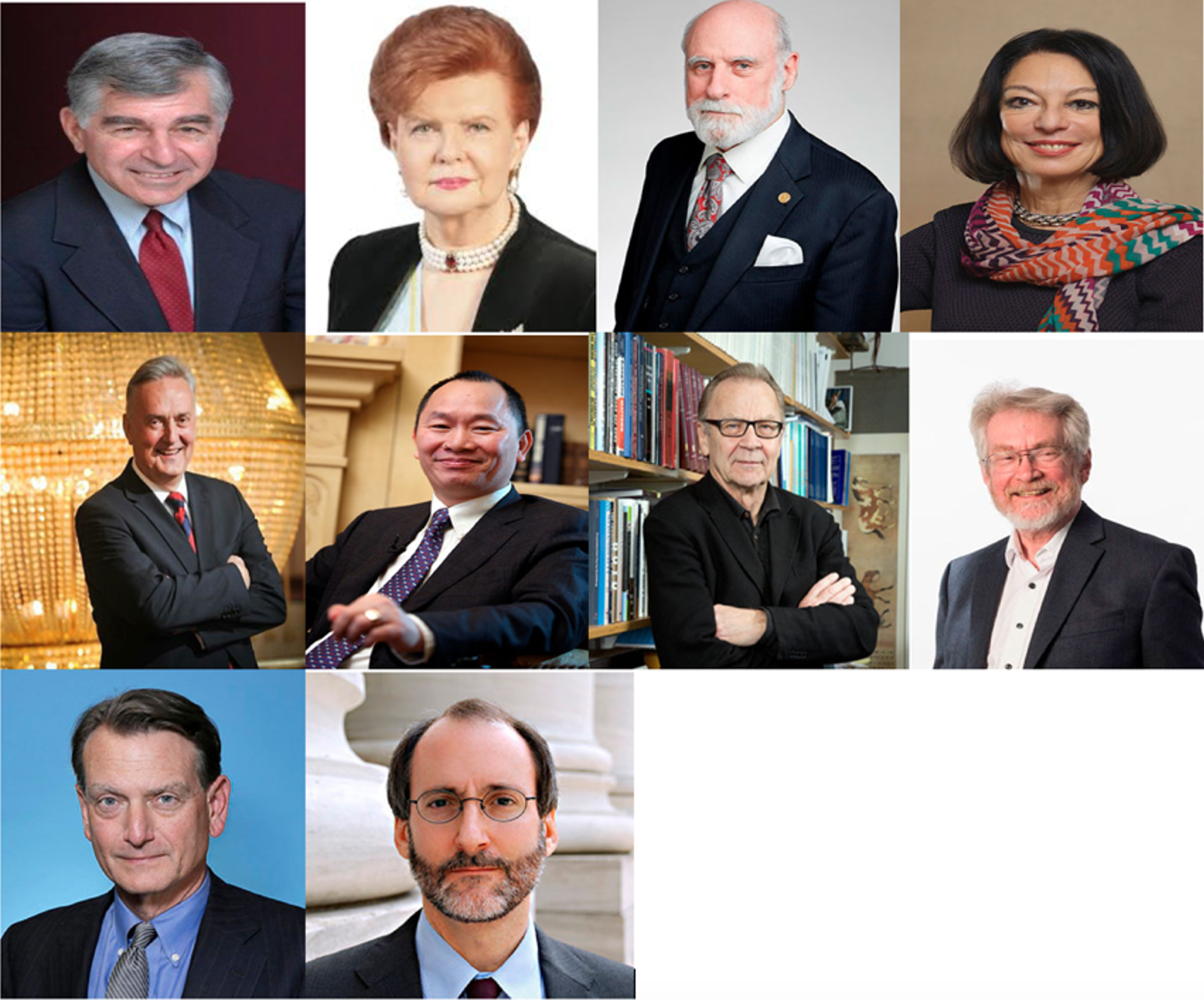
by Editor | Sep 12, 2020 | News
This is the first social contract in the digital, Internet and AI era, a platform for connection among governments, stakeholders, and private and public institutions, and for balancing centers of power, initiated by the Boston Global Forum, will pay particular attention to insights presented by government representatives, academic institutions, think tanks, tech companies and civil society.
The Social Contract for the AI Age was completed and launched on September 9, 2020.
The co-authors of the Social Contract for the AI Age are:
Governor Michael Dukakis, Boston Global Forum and
President Vaira Vīķe-Freiberga, Latvia and World Leadership Alliance-Club de Madrid
Vint Cerf, Father of Internet, Google, Nazli Choucri, MIT,
Prime Minister Zlatko Lagumdzija, Bosnia and Herzegovina,
Tuan Anh Nguyen, Boston Global Forum, Thomas Patterson, Harvard University,
Alex Pentland, MIT, Marc Rotenberg, CAIDP, David Silbersweig, Harvard University
Please view and download Social Contract for the AI Age either here or here.
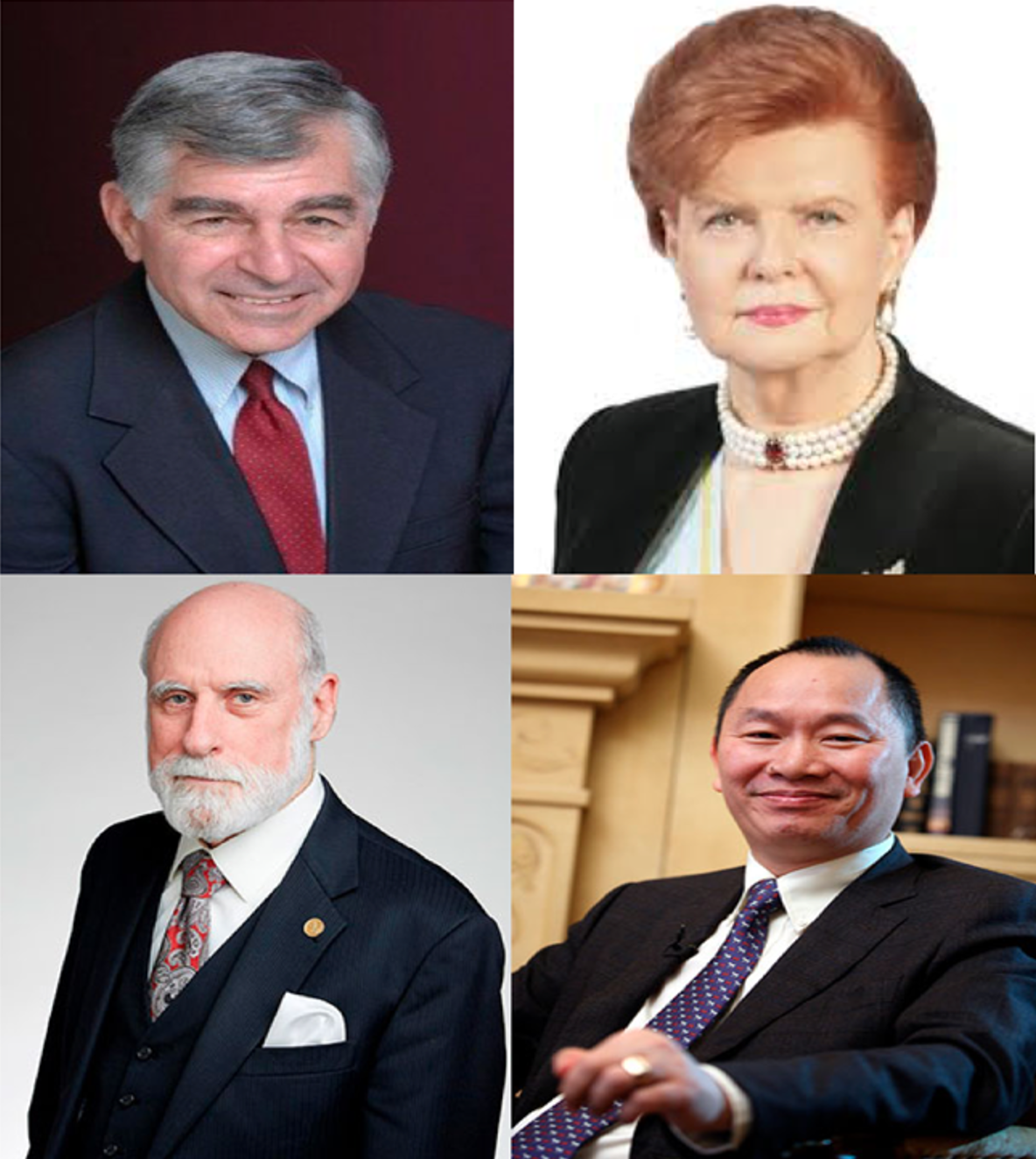
by Editor | Sep 12, 2020 | News
“The Social Contract for the AI Age”, the first social contract in the digital, Internet and AI era, a platform for connection among governments, stakeholders, and private and public institutions, and for balancing centers of power, initiated by the Boston Global Forum, will be officially launched and discussed at Transatlantic Approaches on Digital Governance:
A New Social Contract in the Age of Artificial Intelligence, 16-18 September 2020, organized by World Leadership Alliance-Club de Madrid (https://boston.dialoguescdm.org/agenda/)
Governor Michael Dukakis, President Vaira Vike-Freiberga, father of the Internet Vint Cerf and Nguyen Anh Tuan are four of co-authors invite organizations and individuals sign the Social Contract here.
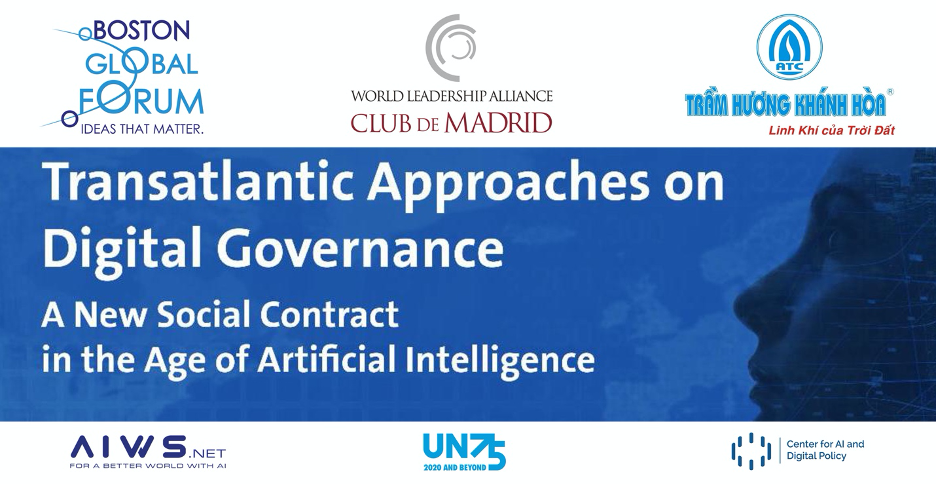
by Editor | Sep 12, 2020 | Event Updates
On 16, 17 and 18 of September 2020, Democratic former Heads of State and Government, Members of Club de Madrid, current Government representatives, experts and renowned scholars will analyse global challenges and offer actionable policy solutions at a transatlantic and multi-stakeholder Policy Lab on the Social Contract for the AI Age, a new social contract on digital technologies and artificial intelligence.
This forthcoming Policy Lab will convene over 10 former democratic Heads of State and Government (all Members of Club de Madrid), Manuel Muñiz, Secretary of State for Global Spain, Ministry of Foreign Affairs, European Union and Cooperation of Spain, as well as world class experts like computer scientist and father of the Internet, Vint Cerf, MIT Professor Alex ‘Sandy’ Pentland, Governor Michael Dukakis, Democratic Party nominee for President of the United States (1988), professors of Harvard, MIT, and top universities. Together, participants will lend their experience-based critical judgement to pioneering discussions which seek, among other priorities, to identify ways of engaging different sectors of society in grounding policymaking while protecting the democratic mandate.
All in all, the rapid rollout of digital technologies and AI beyond the control of states poses a global challenge never seen before, which is why we should not set global, regional and national standards of digital governance without the participation of all societal actors. In this sense, debates from this Policy Lab on “The Social Contract for the AI Age”, the first social contract in the digital, Internet and AI era, a platform for connection among governments, stakeholders, and private and public institutions, and for balancing centers of power, initiated by the Boston Global Forum, will pay particular attention to insights presented by government representatives, academic institutions, think tanks, tech companies and civil society.
The dialogue will also serve as a platform to establish a Transatlantic Alliance for Digital Governance and the AIWS City, an all-digital virtual city based on the standards and norms of “the Social Contract for the AI Age”, “People Centered Economy”, “Trustworthy Economy” and “Intellectual Society”. Lastly, the policy discussion aims to discuss the creation of an initiative to monitor governments as well as companies in using AI and to generate an AI Ethics Index at all levels.
Further information can be found here.




















